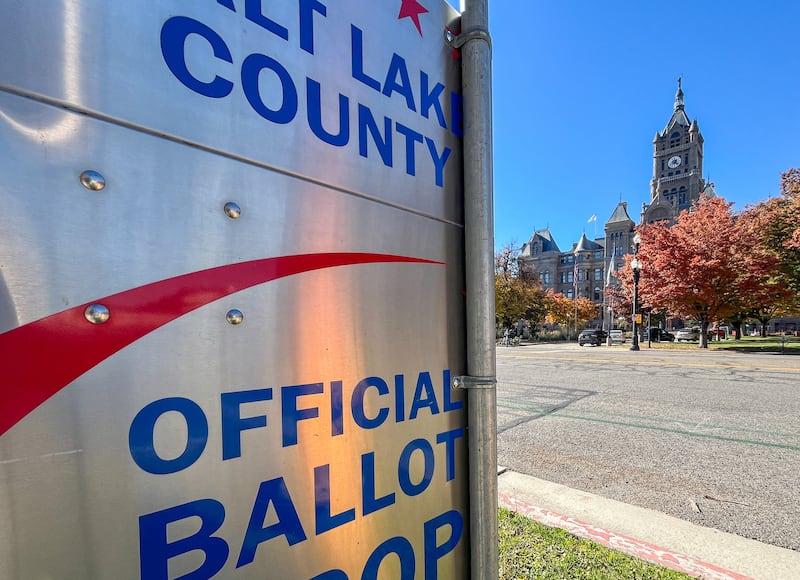It may not be a mayoral election year in Utah’s capital city, but those seeking a seat on its City Council have raised large sums of money with a potential shakeup at stake.
Combined, candidates for the four seats up for grabs have raised nearly $400,000 in contributions, while collectively spending more than $300,000, according to the final Salt Lake City campaign finance report before next week’s election.
Only one seat is guaranteed to change within the state’s largest and fastest-growing city, while one will remain unchanged.
Salt Lake City Councilwoman Sarah Young, whose district covers Sugar House, is running unopposed in the city’s District 7. But there will be a new representative in District 5, as Councilman Darin Mano is not seeking reelection in the district that covers the city’s Ballpark, Central Ninth, East Liberty Park and Liberty Wells neighborhoods.
Fundraising doesn’t always translate into winning races, but it does provide more resources to persuade voters. Records show that most of the money raised this election cycle ended up going toward websites, digital and mailing advertisements, as well as costs associated with in-person events, campaign staff and election consultants.
1 guaranteed change
Tuesday’s report offers a window into donations and spending in the final weeks leading up to that particular raise. Erika Carlsen, co-founder of the Ballpark Action Team, has nearly outraised all City Council candidates this year, collecting more than $103,000 from more than 750 contributions.
These include larger donations from Salt Lake City Mayor Erin Mendenhall and smaller donations from former Utah congressman Ben McAdams, each of whom has endorsed Carlsen since she entered the race. Blaser + Partners Company, Salt Lake Board of Realtors and Dustin Buckthal, owner of The Front climbing gym in Ballpark, are among some of the larger donors to her campaign.
Amy Hawkins, chairwoman of the Ballpark Community Council, raised more than $10,000 in her bid for District 5 after joining the race later in the year. She nabbed a small donation from former Salt Lake City Mayor Rocky Anderson, who ran against Mendenhall in 2023. Business leader David Ibarra and the Ibarra Brito Centre each donated the maximum contribution of $850.
Vance Hansen raised over $5,500, but he also did not file his last finance report, according to the city.
Big fundraising in other races
Salt Lake City’s most crowded race has generated the bulk of election fundraising. Salt Lake City Council Chairman Chris Wharton, the incumbent in District 3, raised the most money out of anyone running, after also raising more than $103,000 over the past few months.
He scored large donations from Mendenhall, groups like Equality Utah and developers like Dan Lofgren and Brandon Blaser, as well as smaller donations from several current and past Democratic lawmakers.
But he faces competition in District 3, which is home to the Avenues, Capitol Hill, Federal Heights, Guadalupe and Marmalade neighborhoods.
Liddy Huntsman Hernandez, the daughter of former Utah Gov. Jon Huntsman Jr., gained nearly $43,000 in contributions, with about 40% of that coming from internal sources, per city records. Blake McClary, a software engineer, gathered more than $34,000 from over 150 contributions. Both landed larger donations from local real estate and property businesses, as well as smaller donations from Anderson, according to the city documents.
The documents also note that the three candidates — combined — spent more than $140,000 on canvassing, consulting, advertising, staffing and materials for in-person appearances at neighborhood events.
Meanwhile, the race for District 1 thinned after Yussuf Abdi withdrew earlier this month. Councilwoman Victoria Petro, the district’s incumbent, led the way in funding as she seeks reelection for the district that includes Fairpark, Jordan Meadows, Rose Park and Westpointe.
She gathered a little more than $50,000 in contributions, including from Mendenhall and McAdams, as well as several key local developers and unions. Stephen Otterstrom, a human resources consultant also vying for the seat, raised close to $10,000, mostly out of pocket.
The two also spent heavily on ads and campaign events.
Salt Lake City opted to continue in the state’s ranked-choice voting pilot program, as it did in 2021 and 2023. That means voters in the election districts can rank their candidates rather than voting for just one.

